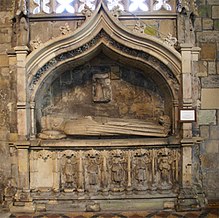Archibald Douglas, 5th Earl of Douglas
| Archibald Douglas | |
|---|---|
| Earl of Douglas Duke of Touraine (de jure) Earl of Wigtown Lord of Galloway Lord of Bothwell, Selkirk and Ettrick Forest, Eskdale, Lauderdale, Liddesdale and Annandale Count of Longueville Seigneur de Dun-le-Roi |
|

Tomb of the 2nd Duke of Touraine & 5th Earl of Douglas
|
|
| Predecessor | Archibald Douglas, 4th Earl of Douglas |
| Successor | William Douglas, 6th Earl of Douglas |
| Spouse(s) | Eumphemia Graham |
| Issue | |
| Noble family | Douglas |
| Father | Archibald Douglas, 4th Earl of Douglas |
| Mother | Princess Margaret of Scotland |
| Born | 1390 Scotland |
| Died | 1439 Restalrig, Midlothian |
| Buried | 1439 St Bride's Kirk Douglas, South Lanarkshire |
Archibald Douglas (1390 – 26 June 1439) was a Scottish nobleman and General during the Hundred Years' War.
Douglas was the son of Archibald Douglas, 4th Earl of Douglas and Margaret Stewart, eldest daughter of Robert III. He was Earl of Douglas and Wigtown, Lord of Galloway, Lord of Bothwell, Selkirk and Ettrick Forest, Eskdale, Lauderdale, and Annandale in Scotland, and de jure Duke of Touraine, Count of Longueville, and Seigneur of Dun-le-roi in France. In contemporary French sources, he was known as Victon, a phonetic translation of his Earldom of Wigtown.
He fought with the French at Baugé in 1421, and was made count of Longueville in Normandy. He succeeded to his father's Scottish and French titles in 1424, though he never drew on his father's French estates of the Duchy of Touraine. Douglas served as ambassador to England in 1424, during the ransoming of James I.
He also sat on the jury of 21 knights and peers which convicted Murdoch Stewart, Duke of Albany and two of his sons of treason in 1424, leading to the execution of Albany and the virtual annihilation of his family.
...
Wikipedia
